All businesses, including SMEs, are obliged to follow in particular the OECD Guidelines for Multinational Companies, when it comes to human rights and corporate social responsibility, or responsible business conduct.
Gunelie Winum is Senior Advisor at the Norwegian company Responsible Business Advisors (RBA). She has 15 years of experience within corporate social responsibility (CSR), including guidance and strategic advice to companies at risk, as well as training of companies and their suppliers.
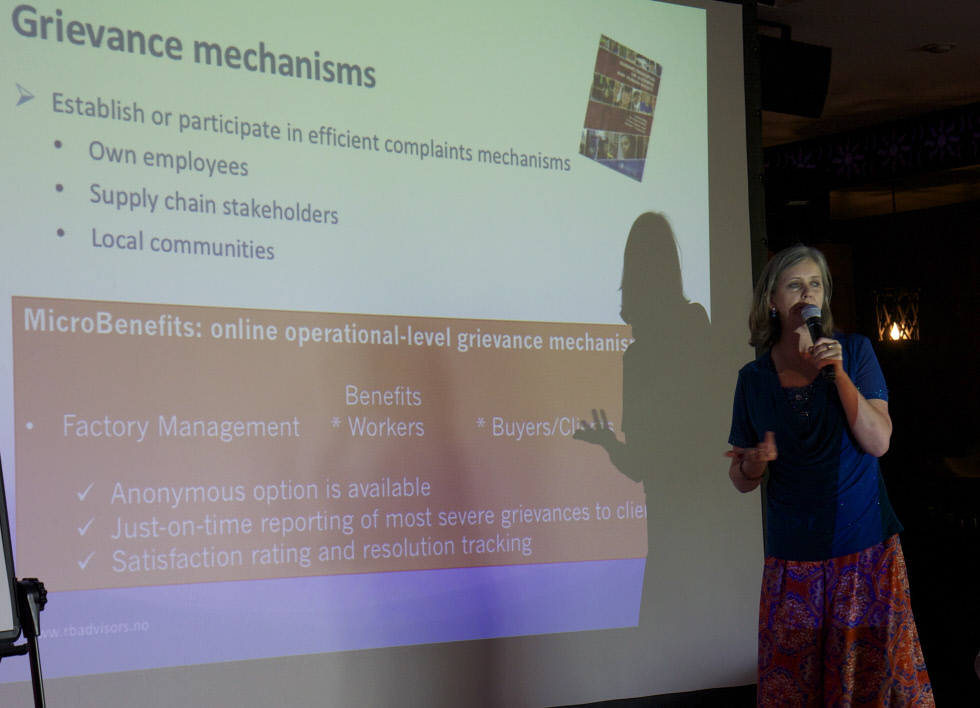
Having trained some 2000 suppliers around Asia on how they to implement the policies set by Nordic and other international companies, she possesses a wealth of insights for all businesses.
At a Bangkok-held Nordic Corporate Social Responsibility workshop she presented the requirements and expectations of the international framework UN Guiding Principles on Business and Human Rights, OECD Guidelines for Multinational Companies, the United Nations Global Compact (initiative to encourage businesses worldwide to adopt sustainable and socially responsible policies and to report on their implementation) and Sustainable Development Goals.
Gunelie explained that, compared to CSR, Responsible Business Conduct (RBC) is the more progressive term, and also what is referred to in a lot of international standards. “RBC means incorporating responsibility in their business operations. Conducted correctly, RBC is good for the own business, for the supply chain stakeholders; involving both management and the workers, and it´s good for local people and the environment. The difference with the term RBC is that it’s an effort to really specify that this concerns the core business activities and not some philanthropy.”
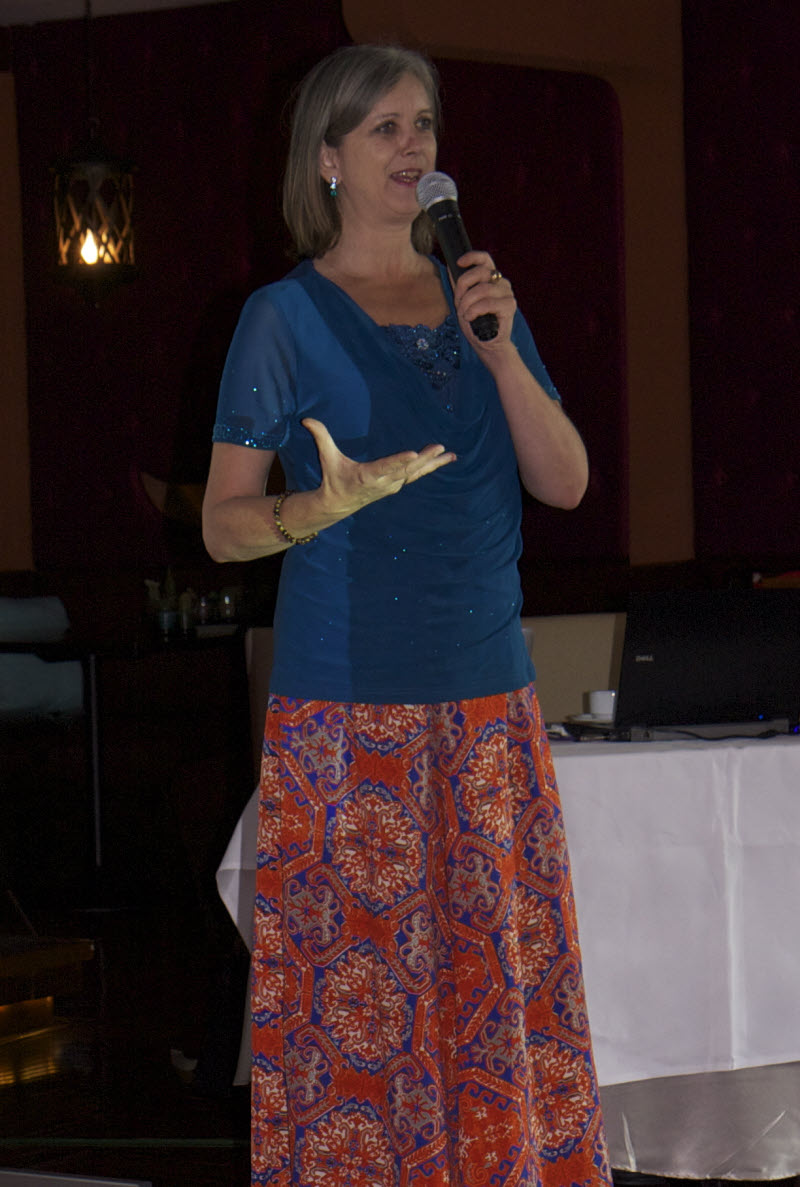 For instance, the term ‘materiality’ is important in RBC: “If you are in oil and gas, building schools is not related to the core business. FHow you affect the local community would be a concern. Your environmental potential damages would be a concern, including if your production pollutes the water, affecting the local fishermen. Then you would be infringing on their human rights and would be obliged to do something about it.”
For instance, the term ‘materiality’ is important in RBC: “If you are in oil and gas, building schools is not related to the core business. FHow you affect the local community would be a concern. Your environmental potential damages would be a concern, including if your production pollutes the water, affecting the local fishermen. Then you would be infringing on their human rights and would be obliged to do something about it.”
Non-related RBC risks being nothing else than CSR activities that amounts to so called ‘green-washing’. “The best way to avoid green-washing is to question: will the action create actual and sustained positive impact for people and/or the planet?” Gunelie told ScandAsia.
“RBC is also an umbrella concept, which concerns the supply chain, working and environmental conditions, corruption etc. a lot of elements.”
“And it has evolved concerning ‘stakeholder’: now it is more and more focusing on those being affected by the production, e.g. the local stakeholders.
Expected to review all human rights
The international guidelines, standards and frameworks for RBC guide the work performed by the RBA advisory.
“There is a tremendous amount of guidelines, frameworks and certification schemes. The OECD Guidelines is an important one, and it’s not only for multinationals; it also applies to SMEs in OECD countries.”
OECD has also come with sectors standards and guidelines (garment and footwear, for instance).
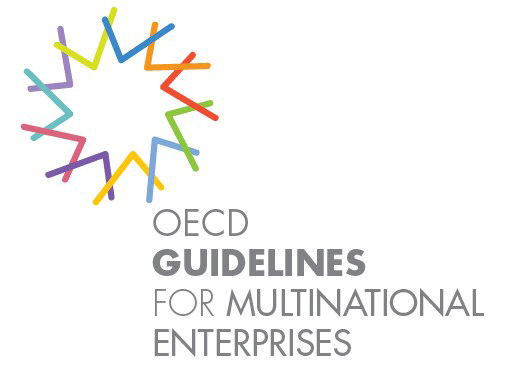
“Many of the challenges and good practice in the garment and footwear sector guidance is also relevant to other sectors, for instance how a company´s own purchasing practices impact on working conditions in the local supply chain.”
Then, there are the core ILO conventions. “The elements that you put in your supplier code of conduct come from conventions and recommendations from the ILO, set by global employers’ trade unions and governments. There are close to 200 of them on different aspects of labour, and a lot of recommendations in addition.”
It’s up to each and every country to ratify those conventions, and by doing that they are obliged to include it in their internal labour law. However, there are four elements that are highlighted by the ILO as the most important conventions to work with. Forced labour, child labour, discrimination and right to organize and bargain collectively.
“It means that even if a country hasn’t ratified them, it is still obliged to follow those as an ILO member country.
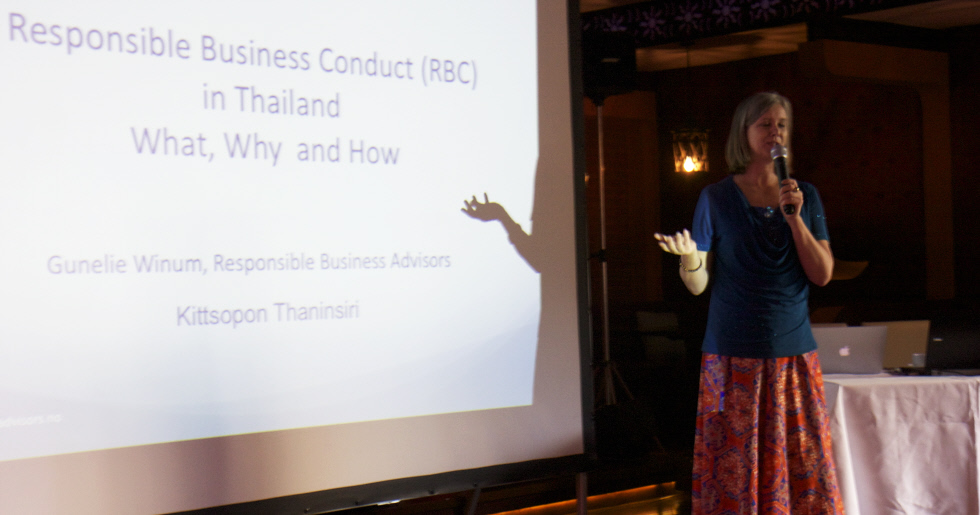
Gunelie recommends companies to have an on-going process: “Do it step by step and as a continuous process– you are never done with whether you are violating human rights or not.”
“A company is expected to review all human rights. The declaration for human rights is the basis document and then you will have to review existing strategies, documents, supplier code of conduct, CSR strategy, and also your business strategies. Are our documents capturing all human rights? Yes, or no?”
“It is also recommended that you should establish a committee – that can be by the board or by the management. Also, say for a Swedish company you would have a committee in the headquarters but a sub-committee in the sourcing country, and that you hold regular meetings.”
“As for assessing whether you as a company have an adverse impact on human rights due to your production, and on the whole supply chain, you do that by conducting desk analysis and via consultations with potentially affected groups. And it’s not easy to assess how your business affects these; not only our business but your suppliers’ business. It’s quite a delicate task. It’s not for nothing that both the OECD guidelines and the UN Guiding Principles on Business and Human Rights recommend that you should also use external expertise in this work, precisely because it’s quite complicated when you get down to it,” she explained.
“The production map is still very non-transparent. Sub-contracting still goes on. It is so easy to be fooled and there is no way to have full overview of everything but it is good that we have come this far as we have. But we [advisors] are still needed to engage companies in a better world.”
“Our company, RBA, has a network of Southeast Asia partners with expertise in various areas, which we contract depending on the client’s needs; for instance social auditors to inspect labour conditions, health and safety experts, environmental experts etc. We quality-assure the local experts and ensure that the actions are in line with international standards.”
As an example, Gunelie mentions that they are assigned by a large Norwegian company to do inspections of labour standards in China. “We found the right Chinese partner with experience in the particular sector and province to carry out the inspections. We jointly provide improvement support based on findings.”
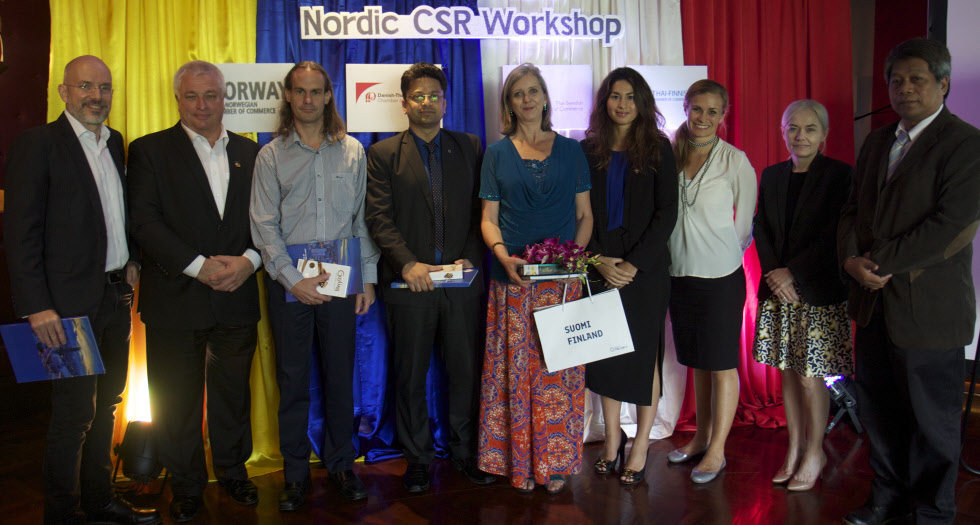
RBC in their business DNA
“I fully understand international standards can seem daunting to SMEs. They are however obliged to follow those, such as those OECD Guidelines (OECD created a communication problem by referring to multinational companies in their title, but then stating here and there that it also applies to SMEs…!).”
“I have worked a lot with SMEs, and find they have several advantages; a main one being that they have long-term trade relationships which create trust; essential for sustained improvements. I also perceive SMEs to have a stronger culture of common-sense, with which one can come far.”
“Newly established SMEs seem to have RBC in their business DNA right from the beginning, for instance in offering environmental-friendly products, and/or offer products made with decent working conditions. RBA tailor-make the advice to each company’s needs. We´re not a consultancy doing the job for them, but guide and enable them to do the job themselves..”
Gunelie has also performed in-depth social dialogue training in Vietnam factories – with great results. “We can even prove that there is a business case for social dialogue: when management start dialoguing with workers they get a lot of constructive input which will also help their pure business KPIs. There is a very strong link between business KPIs and labour standards in factories. Same goes with child labour: we can prove that there is a business case for no child labour.”
She confirmed that human rights and labour issues if of highest risk in developing and emerging countries. “In many of such countries, legislation is OK and even strong on paper. Enforcing the legislation is more challenging, which has many reasons: Weak labour inspectorates and that governments neglect their own legislation in their attempt to attracting foreign investments (for example – by setting up free trade zones where workers are prevented from organizing).”
“On the micro-level, producers are challenged by what is termed as ’the race to the bottom’. Globalized trade makes it easy for a company to switch to a cheaper producer. This is particularly an issue in labour-intensive production like textile.”
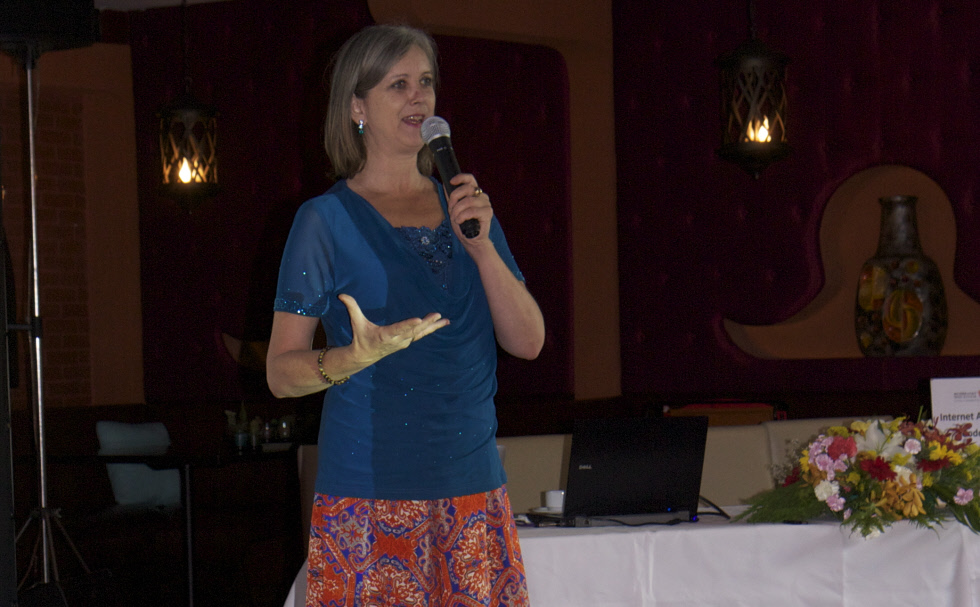
“Most SEA countries have the whole range of factories – from the very best to very poor. A couple of good practice indicators are: i) the more and longer the local company has been in export oriented business, the better; ii) management who has studied abroad (particularly younger generation) are more ’modern’ in their thinking and hence able to adapt to international standards; iii) production which demands skilled workforce are of less risk to violation of labour standards.”
Other rampant problems are weak enforcement of legislation paired with corruption. “What companies can do is to have strong anti-corruption policies and procedures in place and be patient, for instance expect that a needed license might take months or even years longer to obtain.”



